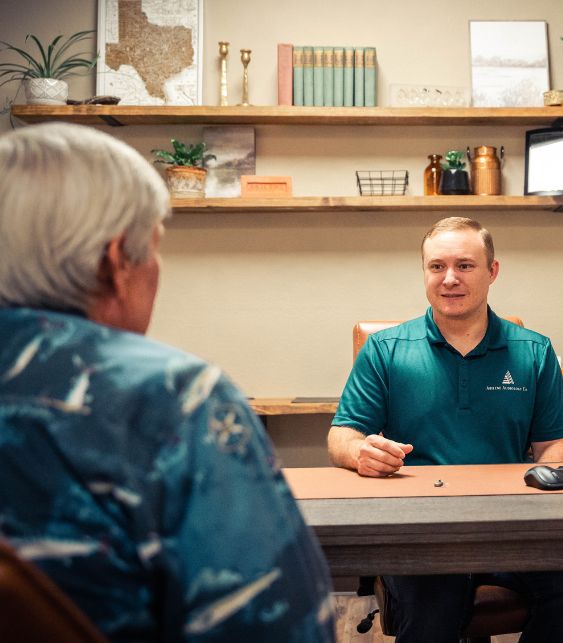Abilene Audiology provides counseling, support, and after care following the implantation of bone anchored hearing aids in Abilene, TX.
Bone anchored hearing aids (BAHA) are a type of hearing aid solution that uses bone conduction to bring sound to the inner ear. BAHAs are designed for individuals who have hearing loss due to problems with the middle ear, outer ear, and those who cannot benefit from conventional hearing aids.
Also known as bone conduction hearing systems or osseointegrated devices, BAHAs are an innovative technology approved by the Food and Drug Administration to address certain types of hearing loss.
There are non-surgical and surgical options for bone conduction hearing systems.
Abilene Audiology provides counseling, support, and after care following the implantation of bone anchored hearing aids.

How do bone anchored hearing aids work?
The sound processor of the BAHA picks up sound waves, converts them into vibrations, and transmits them to the implant through the abutment. The BAHA then stimulates the inner ear, making sound perception possible.
What are the three main components of bone-anchored hearing aids?
A bone-anchored hearing aid consists of three main components:
- a small titanium implant surgically placed in the skull bone behind the ear
- an abutment that protrudes through the skin and connects to the implant
- a sound processor that attaches to the abutment
How will I know if I need a surgical or non-surgical system?
The specific type and degree of your hearing loss, the anatomy of your ears and head will determine if you need a surgical or non-surgical bone-anchored hearing system.
Below are some general considerations to help you determine which option would be best for you:
Surgical Bone Conduction Hearing Systems:
- Recommended for individuals with single-sided deafness or conductive or mixed hearing loss
- If you have a healthy skull bone that can support the implant
- If you have ear canal or middle ear blockages
Non-surgical Bone Conduction Hearing Systems:
- Recommended for individuals with mild to moderate conductive hearing loss
- If you have limited skull bone thickness, you may be considered for non-surgical bone conduction hearing system
- Ideal for individuals who want to try BAHAs but not yet ready to undergo surgery
Ultimately, the decision of whether to get a surgical or non-surgical bone conduction hearing system should be made in consultation with an Audiologist or ENT doctor.
Audiologists at Abilene Audiology are trained to perform a thorough evaluation of your hearing loss, conduct hearing tests, and discuss the pros and cons of each option to help determine which hearing solution is the best fit for you.

Frequently Asked Questions
Here are a few of the questions that patients frequently ask related to bone-anchored hearing aids. If you have a specific question that you need answered, please contact us.
Who can benefit from BAHAs?
Bone-anchored hearing aids are recommended for individuals with single-sided deafness, conductive or mixed hearing loss. Individuals with ear abnormalities or malformations can also benefit from bone-anchored hearing aids.
BAHAs can also be recommended for individuals who, for some reason, cannot wear or benefit from conventional hearing aids.
Overall, BAHAs can provide significant benefits for people with hearing loss, including improved speech understanding, better sound quality, and increased comfort and convenience compared to other hearing aid options. However, as with any medical device, there are risks associated with surgery and the use of the implant, and not everyone may be a suitable candidate for a BAHA.
What kinds of accessories work with bone-anchored hearing aids?
There are various accessories that are compatible with bone-anchored hearing aids (BAHAs) to improve functionality and enhance the overall listening experience.
Some of these accessories include:
- Remote controls
- FM systems
- Phone clips
- Smartphone apps
An audiologist can help you learn more about which accessories are compatible with your specific model of bone anchored hearing aid.
What is the difference between a cochlear implant and a bone anchored hearing aid?
Cochlear implants and bone anchored hearing aids work in different ways and are suited for different types of hearing loss.
Cochlear implants bypass the damaged hair cells in the inner ear and stimulate the auditory nerve directly. They are typically used for severe to profound sensorineural hearing loss.
Bone anchored hearing aids are suitable for individuals with conductive or mixed hearing loss, unilateral deafness, or other types of hearing loss that affect the middle or outer ear.
Both cochlear implants and bone anchored hearing aids are effective in improving hearing. However, they are designed to address different types of hearing loss and function in different ways.
An audiologist can help determine and recommend which device is the most appropriate for your unique hearing needs.
Bone Anchored Hearing Aids | Abilene Audiology Co., Abilene, TX
Hearing aids are the most common solution for hearing loss. But what if you can’t benefit from conventional hearing aids?
Bone anchored hearing aids might be the solution for you. To learn more about bone anchored hearing aids in Abilene, TX, schedule an appointment with our audiologists today!
